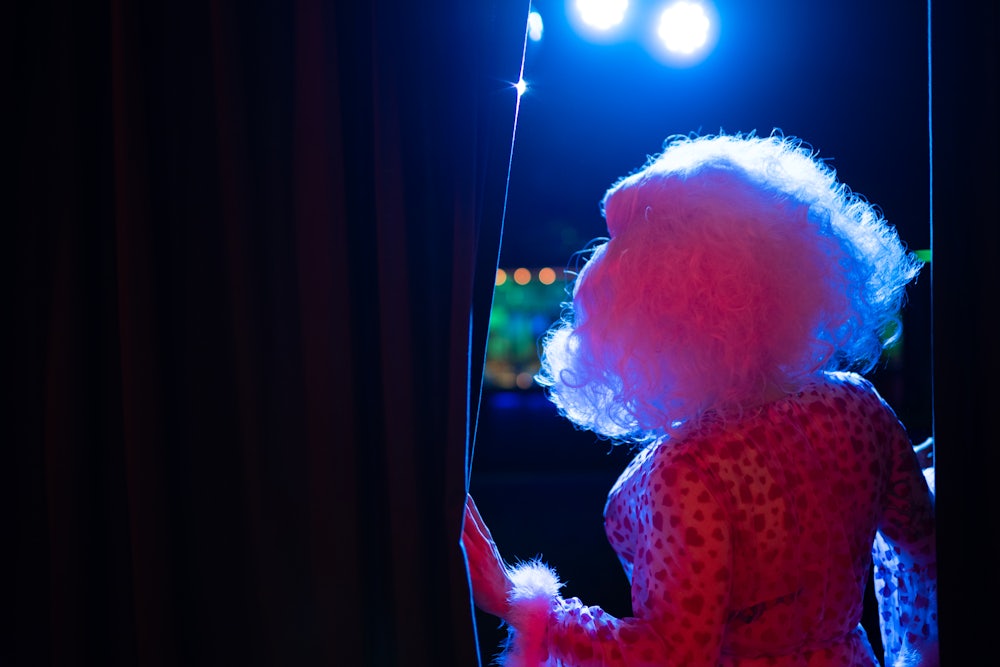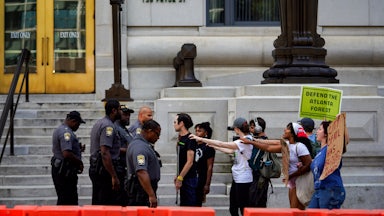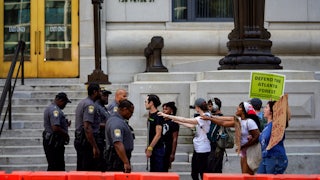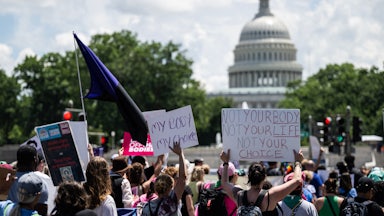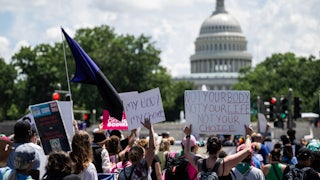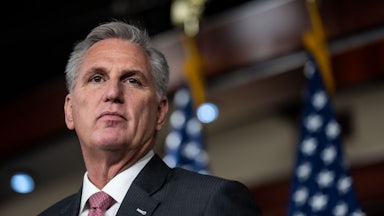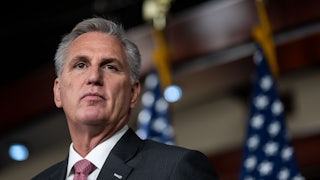Judge Matthew Kacsmaryk made national headlines earlier this year when he issued a ruling that sought to ban mifepristone, the most commonly used abortion medication in the country. (That ruling is currently on hold pending appeal.) Now he has taken his ideological crusade even further by dismissing a First Amendment lawsuit against a public university in Texas that banned an on-campus drag show earlier this year.
“The First Amendment does not prevent school officials from restricting ‘vulgar and lewd’ conduct that would ‘undermine the school’s basic educational mission’—particularly in settings where children are physically present,” he wrote in his decision last week, quoting from legal precedents on how the First Amendment generally applies in public schools and speaking hypothetically.
The ruling is considerably out of step with the other federal courts. As Law Dork’s Chris Geidner noted last week, federal judges in four other states have cited the First Amendment in rejecting drag show bans. But that part is not surprising: Kacsmaryk, who worked as a lawyer for a conservative Christian legal organization before Donald Trump elevated him to the federal bench in 2019, has often ruled against protecting LGBTQ Americans from discrimination.
What stands out the most about Kacsmaryk’s ruling is his approach to free speech issues in general. While the Supreme Court has largely taken an expansive view over the last half-century of the First Amendment’s speech protections, he argued in favor of turning back the clock to a more puritanical era when the government had broad powers to censor speech and content that it deemed morally deficient. In sum, Kacsmaryk appears to place his own moral views over Americans’ free speech rights.
The case, Spectrum WT v. Wendler, began when a student organization at West Texas A&M sought earlier this year to host a drag show on campus as a fundraiser for the Trevor Project, a suicide-prevention group that focuses on LGBT youth. Walter Wendler, the university’s president, sent out a campus-wide email in March to announce he had canceled the event because it was demeaning to women, comparing it to minstrel shows and blackface.
“A harmless drag show?” Wendler wrote in the email. “Not possible. I will not appear to condone the diminishment of any group at the expense of impertinent gestures toward another group for any reason, even when the law of the land appears to require it.” It is rare that a government official—West Texas A&M is a public university—openly admits to doing something that runs contrary to “the law of the land.” In theory, that made it much easier for Spectrum WT, the campus LGBTQ organization, to file a lawsuit against Wendler for violating their constitutional rights.
Unfortunately for Spectrum WT, they found themselves before Kacsmaryk. “At this stage of litigation, Plaintiffs cannot prevail by invoking the word ‘expression,’ as if the Free Speech Clause obliterated all logical distinctions separating (1) thought, speech, and conduct, (2) ‘time, place, and manner,’ and (3) children from sexualized conduct,” he concluded in a decision handed down last week. Kacsmaryk concluded that drag shows as a whole have no First Amendment expressive purpose, a conclusion he reached only after twisting existing free speech precedents beyond recognition.
Kacsmaryk began his opinion by revisiting how courts analyze legal challenges based on constitutional rights in the first place. While the First Amendment’s free speech clause is a vast field of law, featuring balancing tests in some areas and bright lines in others, Kacsmaryk suggests that much of it may be invalid on originalist grounds. “Free Speech jurisprudence only intermittently invokes the historical analysis applied to other Amendments and Clauses,” he wrote.
The judge pointed to two areas where the Supreme Court has shifted things toward a history-and-tradition test in recent years: the 2019 case American Legion v. American Humanist Association, which involved the establishment clause, and New York State Rifle & Pistol Association v. Bruen, which focused on the Second Amendment. The former involved a challenge to a war monument shaped like a large crucifix on public land in Maryland; the latter sought to overturn New York’s system for obtaining a concealed-carry license.
History-and-tradition tests for constitutional rights constrain the government’s ability to enact laws and policies based on what was acceptable in a particular time and place—in most cases, early nineteenth-century America. In the Second Amendment context, Bruen’s history-and-tradition test expanded the individual right to bear arms because states imposed far fewer restrictions on gun ownership and possession at the time. But in the First Amendment context, as Kacsmaryk approvingly noted, a history-and-tradition test would significantly limit free speech rights since founding-era Americans were far less permissive than their modern descendants.
Said historical analysis reveals a Free Speech ecosystem drastically different from the “expressive conduct” absolutism of Plaintiffs’ briefing: (1) the Founders focused on “prior restraints” of publication—specifically, political pamphlets, (2) draft Free Speech Clauses focused on protecting the “right to speak, to write, or to publish their sentiments,” (3) Blackstone treatises extolled “freedom of thought” and recognized a police power “to censure licentiousness,” (4) the Comstock Act of 1873 prohibited the mailing of “obscene, lewd or lascivious” materials, and (5) Joseph Story’s Commentaries defined the Free Speech Clause as protecting the “right to speak, write, and print … opinions upon any subject whatsoever, without any prior restraint,” but not the right to “injure any other person in his rights, person, property, or reputation” or “to disturb the public peace.”
That “drastically different” ecosystem, of course, is no longer the dominant framework with which courts view First Amendment issues. What counts as “licentiousness” or “obscene, lewd, or lascivious”? The Supreme Court has largely abandoned that question—and most obscenity laws with it—since Miller v. California in 1973. When does something “injure any other person in his rights, person, property, or reputation”? The justices have set an extremely high threshold for libel cases since New York Times v. Sullivan in 1964. When does something “disturb the peace”? Since the 1969 ruling in Brandenburg v. Ohio, a speaker does not fall under the First Amendment unless they are inciting “imminent lawless action.”
Kacsmaryk’s focus on “political” speech in this analysis would leave a broad range of other speech unprotected. While he does not explicitly say the existing precedents are wrong outright—as a district court judge, he cannot actually overturn them—it is pretty clear that he does not favor their continued application. “Beginning in the late 20th century, Free Speech jurisprudence absorbed ‘expressive individualism’ as the new sine qua non of First Amendment analysis,” he added, in a tone that can only be contextually understood as disapproving.
Kacsmaryk’s citations for that last claim are particularly revealing. One of them was a legal treatise by Stanford University law professor Lawrence Friedman. The other, more unusual one was a book by Christian theologian Carl Trueman that critiques the sexual revolution, Obergefell v. Hodges, and “transgenderism.” Theologians are not typically cited in federal court rulings, and none of the parties cited Trueman’s book in their briefs for the court. Kacsmaryk apparently found it relevant of his own accord for reasons known only to him.
That citation was also far from his strangest one. Later in the opinion, he cited a website by the organization Gays Against Groomers as evidence that drag shows don’t necessarily further LGBTQ rights. Another was to a City Journal article by Christopher Rufo, a right-wing activist who has argued that discussing LGBTQ issues in public schools is tantamount to grooming children for sexual abuse. Rufo’s bad-faith campaigns against public education and anti-racist activism have made him a burgeoning star among American conservatives: Florida Governor Ron DeSantis appointed him to the board of the New College of Florida earlier this year.
The Rufo citation stands out because Kacsmaryk used it to brush aside a factual claim the plaintiffs made in their complaint. “Although Plaintiffs attest the show was rated ‘PG-13’—a term undefined by Plaintiffs but presumably based on the familiar Motion Picture Association (“MPA”) ratings—contemporaneous media accounts of similarly advertised events reflect a range of highly sexualized content,” he wrote. One could be forgiven for thinking that Kacsmaryk is just trolling Spectrum LT by ignoring their sworn complaint in favor of Rufo’s blogging.
In another instance, the judge appeared to misstate the facts behind the case outright. The campus LGBTQ group said in its complaint that it “forbade anyone under 18 from attending the event unless accompanied by a parent or guardian (intended for family members of students who want to come with students’ parents to show their support).” Kacsmaryk, in an incredible act of bad faith, cited this portion of the complaint to state that they “advised President Wendler the event would be open to children.”
It is hard to imagine that a majority of justices on the Supreme Court would be willing to embrace Kacsmaryk’s vision for the First Amendment. But that makes it no less troubling that a sitting federal judge would decide cases based on such a tortured understanding of the free speech clause—and a stunning willingness to impose his own particular moral views through his rulings. In a pluralistic society, Judge Matthew Kacsmaryk is more than entitled to hold those views. But that pluralistic spirit means the rest of us must be free to reject them for ourselves. This is not Puritan New England, no matter how much the judge might prefer it to be.
